- Home
- Linda Byler
Becky Meets Her Match Page 2
Becky Meets Her Match Read online
Page 2
She cried a bit then. She wasn’t aware of it really. She just felt two tears slide down the side of her face, tickling her cheeks. She felt sad and elated, happy to have arrived at this wisdom, this knowledge of her own self-worth.
No one can take away this feeling of inner confidence when they don’t know it’s there, now can they? Not even Mam or Nancy. So I won’t make a fuss. I’ll just act as if I’m reading the booklet.
She sighed, sniffed, rolled over once, and fell into a deep, restful sleep.
As the autumn days went by, the Wisconsin landscape changed from the brown and dull greens of a summer without sufficient rainfall, to a panorama of golds and brilliant reds and oranges. Frost was in the morning air, nipping Becky’s nose. She stumbled to the barn, wiping the sleep from her bleary eyes. She had overslept and developed a sore throat, so Jake took her turn at the milking.
Upon reaching the milk house, Becky threw some calf starter into a plastic bottle, added water, and shook it, then started another bottle. They had a whole line of white calf hutches behind the barn, filled with the knobby-kneed, doe-eyed little creatures she loved. She knew each one by the markings on their coats and the names she gave them. Ivy, Mollie, Sadie, Gina, Lily, and Bena.
The milk house door swung open, and her father came through, his old straw hat torn and bent, his heavy blue shirt wrinkled but clean, his eyes twinkling at her behind his glasses. His beard was long and thick and already tinged with gray along the sides.
“Well, there you are, Becky,” he said, a wide smile creasing his kindly features.
Becky grunted and kept mixing calf starter.
“Didn’t sleep so good, did you?”
Becky shook her head.
“You’re getting nervous with that long awaited sixteenth birthday rolling around, huh?”
Becky shrugged her shoulders.
“Oh, come on. You know you’re looking forward to your rumschpringa.”
“Not according to Mam and Nancy.”
Dat’s eyes narrowed. He set down the bucket he was carrying, leaned against the bulk tank, and crossed his arms. “What do you mean by that?”
“I’m too fat.”
For a long moment Dat said nothing. Becky knew he was a man of few words, especially at emotional times, so she picked up the bottles of calf starter, preparing to lean against the milk house door to open it, when he spoke.
“Becky, don’t let them change you. Believe me, you will make some lucky guy a wonderful wife.”
If Dat had been an English father, he would have hugged Becky, holding her close for the comfort and love a hug provided. As it was, his words wrapped themselves around her like arms, and she smiled with her eyes, then quickly exited.
The morning took on a rosy hue. Diamonds sparkled in the dew-topped grass; the air was magical and filled with promise. The birds sang their liquid notes; the mockingbird put on his own personal show from the yellow sugar maple. Dat’s words filled Becky’s world with color. Her steps became sure and firm as she held her head high on this wonderful day. She nuzzled the top of Ivy’s head with her face, breathing in her little cow smell.
At the breakfast table, she helped herself to two fried eggs, three sausages, and a hefty slice of homemade toast, without sparing the butter and strawberry jam. She also polished off two pancakes, topped with more butter and syrup.
Nancy was absent, having gone to market early. She worked at a bakery in a farmer’s market in the local town of Concord, so her driver picked her up at 4:30 in the morning. Abner and Aaron were off to their construction jobs, leaving only Junior, Jake, and Becky at the morning table.
Mam drank her coffee, throwing worried glances in her hungry daughter’s direction, sighed with her mouth compressed, but said nothing.
Dat discussed the day’s work with the boys and asked Becky if she was available to drive the horses to finish up the haying. “Supposed to rain tomorrow,” he said.
“Well, then, we’ll plan on going to the dry-goods store, Becky. We need to sew for you,” Mam interjected.
Becky looked up from her plate, waiting for Mam’s smile that always appeared for Nancy, along with eagerness and poorly concealed pride. But the smile was absent and never showed up; only raised eyebrows and a concerned look filled Mam’s worried eyes.
Becky said nothing.
“Big times coming for little sister,” Jake grinned.
Mam did smile, then, at Jake. “I’m sure you and Junior will take good care of her.”
“Of course.”
Which was comforting to a degree. Becky knew she would never have to worry about a ride to the supper crowd or the hymn-singings on Sundays. But on Saturday nights her brothers went to functions with their friends—volleyball games or ping-pong tournaments—so she’d likely not be wanted then.
Mam sipped her coffee as the boys headed to the barn.
“Becky needs a job now,” she announced.
Dat looked at his wife, patience written on his face. “You think?”
“Why, Enos, of course.”
“What’s wrong with letting her stay right here on the farm? She’s such a good hired hand.”
“What about her dresses? And coats? Shoes and a bedroom suite, paint and curtains. Enos, it costs to have a daughter turn sixteen.”
“I’ll pay her a weekly wage.”
Mam swallowed the huffy retort that rose to her lips. Becky could tell by the way she began to speak, then closed her mouth and looked pained, as if not saying the words she wanted to was like having a ping-pong ball stuck in her throat.
“Whatever you think best, Enos,” Mam said, but the pained expression stayed, meaning the ping-pong ball in her throat had likely settled in her stomach now.
“Why sure, Becky. How about thirty dollars a day? That’s 150 dollars a week. That will buy you anything you need.”
That was an awful lot of money. “I don’t need that much,” she said.
“You will, Becky. If you pay for your new things,” Mam said, a touch of weariness in her disappointed face.
So, this was the picture. She was turning sixteen, she would stay at home on the farm, collect her wages, buy her own dresses and shoes, and still be able to save some. That was a good deal. She sat up straighter, looked around the table, and said quite cheerily, “Well, sounds like a deal. I’ll be happy to stay here on the farm. I dreaded going out and getting a job.”
“You’d make a lot more money,” Mam said.
“I’d also have a lot less fun. I love the farmwork, Mam. I’m happy here with the barn, the animals, the fieldwork.”
Dat beamed.
Mam smiled at her, with the ping-pong ball lodged firmly in her throat again, Becky imagined.
CHAPTER 2
THE WISCONSIN LANDSCAPE WAS FLAT AND mountainless, with Amish homesteads dotted across the well managed squares of farmland, separated by trees growing in fencerows, or plots of trees that were big enough to be called a woods. Streams and ponds collected the rainwater, and underground spring water gurgled and shimmered in the crisp fall air, hosting the crappie, bluegill, and trout that swam in their waters.
The fields rang with the sound of horses and wagons, choppers and balers, as the busy farmers hurried to get in the last of the fall crops. Winters were long and cold and harsh as far north as this land lay, so the people knew to be prepared. The barns, silos, and long white mounds of plastic bulged with corn silage, hay and corn fodder, straw, and shavings.
When cold hung across the land in the fall of the year, it was the signal to become serious, to get ready for winter’s frigid blast of arctic air that would come roaring in, filled with ice and snow and numbing cold. Hydrants were wrapped with insulation, straw bales banked on the north side of heifer barns, and blades were attached to horse-drawn equipment so they could function as snowplows of a sort. At least they worked well enough to remove snow from around the buildings and out the drive so the milk truck could make its entrance and exit.
Enos E
sh’s farm was located at the northern end of the settlement. The large red barn had been enlarged with a new dairy barn jutting out the front; its new steel siding was also red, to match the paint on the old structure. The house was white, built in the forties, a plain, square, cracker box of a house with a narrow porch along the front and a redwood-stained patio on the back. Shrubs and trees dotted along the side of the house, a kind of adornment to ease the severity of the house itself.
They had remodeled some. Enos thought Sadie should have new kitchen cabinets and linoleum, which had made a world of difference to his wife. He had persuaded her to move to Wisconsin from her life of security and ease in Lancaster County. She had left a brand new house built of stone and beige siding, landscaped to perfection, with the barn matching the house. A fancy place, they had. Or so some thought, shaking their heads and saying Enos sei Sadie always got what she wanted. But then, Enos had a good business, installing seamless gutters the way he did.
All that changed when Enos decided that each of his four boys needed a farm, and there was no way he could pay a million dollars for Lancaster’s rich, productive farmland.
Sadie balked. “Why Wisconsin? Enos, siss net chide. Why not Perry County or Dauphin County or even Sugar Valley, where you can hire a driver and in a few hours be home with the freundshaft?” she asked.
But Enos had his heart set on Wisconsin. His uncle Abe lived there, and Sadie’s sister Ruth. (Here Sadie reminded Enos of the awful homesickness Ruth had endured, brave soul.)
In the end, they made the trip out there several times. Sadie felt the need for daily prayer, eventually feeling the will of God slowly settling around her shoulders as she searched the Scripture for direction. She couldn’t get away from it. “Whither thou goest, I will go,” as Ruth said in the Bible. Abraham’s wife, Sarah—now what if she had thrown a tantrum and refused to go when God called her husband to go forth? And “Wives, submit to your husbands,” in the New Testament. Over and over, there it was, in black and white.
For a long time, she coasted along in the gray area of her own making, thinking that if Enos loved her the way a man should love his wife, he’d give up his will and stay in Lancaster.
And yet she knew Enos was right. Their four rowdy boys each needed a farm.
And so they went. They packed their belongings in two tractor trailers, bade their families staunch if tearful farewells, and moved a thousand miles away to a run-down, old farm that held all the charm of a broken toenail.
Becky was born in Wisconsin, the only one of their children. Sometimes Sadie thought, grimly, perhaps the Wisconsin air and water had something to do with her being so large. Although she knew better. Somewhere, somehow, generations back, there was likely a gene that traveled along in the Esh family or hers, which caused someone to have an inherited love of all things edible, especially breads and pastries.
And so Sadie gathered her courage and gave herself up to having a daughter who would be part of that world of teenagers who weighed, she guessed, close to two hundred pounds. She bought the fabric, taught an unwilling and restrained Becky to sew, then finally gave up and chased her out of the house to help her father. Sadie sat down and sewed a whole row of short, wide dresses.
She held them up, shook her head, then pressed them. Next, she made large capes and enormous black aprons that she wrapped around herself when no one was looking, marveling at the size of her daughter, the absolute largeness.
She confided in her sister Ruth, who had five daughters of her own, every one lean, rangy, hardworking, and blessed with a metabolism that disposed easily of any calories they consumed. Nor did they have interest in doughnuts and homemade pizza and candy bars.
“Oh, but she’s so pretty,” Ruth said. “She has the most beautiful face, her hair is combed so neat, her covering so clean and perfect. Lydia can hardly wait till Becky goes along to the youth crowds.” Inwardly, Sadie cringed, thinking of Ruth’s Lydia being Becky’s best friend. Inseparable, they were, at that. Lydia was tall and willowy, athletic, one of the top volleyball players. Would Becky even be able to play?
Well, enough of this. Mentally, she shook herself. Too much emphasis was put on looks, according to the ways of the world. How was she any different, struggling along like this? She would pray to God and have faith that Becky would be accepted, perhaps not by the most popular ones, but at least enough to make her own way.
Ach, there was no denying it, Amish or English or Mennonite or anything, even Chinese or African American, we all—every one of us—care about our daughters when they grow up to be a marriageable age. We just do.
She thought of herself and her friend Dorcas Rissler and of Stacy who took her for groceries in her minivan. All of them together, were they so much different when it came right down to it? The concern for daughters was universal.
And there was Nancy who could have any eligible young man. Surely this would be hard for Becky as the years went by and no one asked her to be his girlfriend. So she went home and made five pumpkin pies, mixed up a batch of chocolate chip cookies, and made macaroni salad and fried chicken for supper.
They painted Becky’s room white.
“Why white?” Nancy sniffed.
Becky stopped her roller long enough to glare at her and said she liked the simplicity of it. “Cool and restful,” and she could decorate any way she wanted if her new bedroom furniture was black.
“Are you actually getting black furniture?” Nancy asked, incredulous.
Becky faced her sister, hands on her hips, her triangled bandana crooked on her head, paint splattered all over her navy blue dress that was straining at every seam.
“I sure am. This is my room, Nance, my colors, my choice, and if you don’t like it, well, then, you don’t have to. I do.”
Nancy’s eyes widened, and she said nothing more, taken by surprise. After a few minutes, she asked, “What color will your curtains be?”
“I really don’t know. I’ll have to see after my furniture is delivered.”
Mam plied her trimming brush, looked from one daughter to another, and felt sorry for Nancy’s lack of wit. But Nancy always knew things—what color was popular, how to decorate, where to buy things that made a young girl’s room attractive.
“I might not have curtains,” Becky said, breezily.
“You have to.”
“No, I don’t.”
“What would you do without curtains?”
“Look out the windows.”
Nancy smiled, then grinned widely. “And everyone would be able to look in.”
“Not upstairs.”
Nancy sat on the bed watching Becky move the roller expertly down the walls, then back up, over and over, doing an excellent job. The walls looked fresh and clean, but so very, very white.
Becky’s arms were spilling out of the too tight and too short sleeves, her elbows dimpled with excess flesh. Nancy tried to be kind, but tact was not her best talent, so she blurted, “Your arms look twice as big when the sleeves are too tight.”
Becky went right on rolling the white paint.
“Really? Well, now ain’t that somepin’?”
Nancy laughed along with Becky, but her smile didn’t last very long, dwindling down to a lopsided chuckle that contained a wee bit of dashed pride. It was almost as if Becky had turned the remark about fat arms on her sister. Nancy wasn’t used to feeling self-conscious, but somehow, by some trick of Becky’s, she did.
Nancy wandered away into her own room that was painted a dusty teal color and furnished with an oak bedroom suite and curtains to match the blue-green of her comforter. She had always loved her room and still did, as she shook off the feeling of being outdone.
What was coming over Becky? She seemed to have some secret ingredient firmly in hand as she approached her sixteenth birthday like a barge on a river, every engine put to its full capacity, churning big and steady and sure of herself, her eyes wide open, enjoying all of it. Never mind her size!
Oh, she m
ust never confide in Becky what she herself had gone through. Not only was she intimidated by her cousins and feeling as if Mam didn’t make her dresses right, her hair was thin on one side, leaving a bald spot when she wet it or rolled it higher, the way some girls did when they approached rumschpringa.
Her coverings seemed dowdy compared to some of the girls’ in her group, and it never failed, before a weekend rolled around, that she developed either a rash of pimples, a nervous tic in her eye, or a greasy nose.
Mam had been a tremendous boost to her flagging sense of self-worth, praising her ability to comb her hair and the way she walked in her new shoes. She could tell Mam was as excited as she was the first time the neighbor boy, Leon Miller, came to pick her up. To this day, Mam’s understanding, and the esteem in which she held her oldest daughter, boosted Nancy to a pinnacle where she could accept herself.
So how would Mam and Becky manage together? For starters, what had become of the Weight Watchers program? Actually, the glossy booklet was kept in the top drawer of Becky’s nightstand, unused and forgotten. Every once in a while, when Becky would feel too full of Mam’s meat loaf or coconut pie, she would reach under her pile of books and retrieve it. She’d flip the pages and read the calorie content of this or that, never seriously considering that she could apply one ounce of brain power to calculate her day’s food intake.
What a waste of time and energy, really, Becky thought. Especially if you were a farm girl. All that heavy lifting, sweeping, switching milkers, jostling around on various pieces of farm equipment, even hanging on to the reins of rowdy horses—well, Weight Watchers was not started with Amish farm girls in mind.
Becky’s birthday, November 22, was cold and blustery. Raw air crept underneath gloves and coats, tugged at head scarves and hats, and sent folks scuttling from house to barn, heads bent, hands placed firmly on the tops of battered old straw hats.
Out on the south ten acres, the rusty squeaking of the old disc harrow stayed in harmony with Becky’s voice, her scarf ends whipping in the wind, dust and bits of dead, brown corn fodder whacking her face. She was singing at the top of her voice, belting out some old song from school. Her cheeks were red with the cold, her hands clutching the flat leather reins as she kept the horses in line.

 A Second Chance
A Second Chance Lizzie's Carefree Years
Lizzie's Carefree Years The More the Merrier
The More the Merrier Love in Unlikely Places
Love in Unlikely Places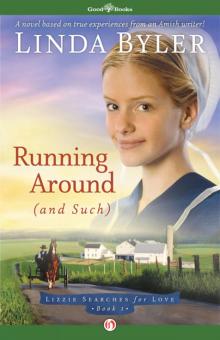 Running Around (and Such)
Running Around (and Such) Wild Horses
Wild Horses Lizzie Searches for Love Trilogy
Lizzie Searches for Love Trilogy Lizzie and Emma
Lizzie and Emma Little Amish Matchmaker
Little Amish Matchmaker The Witnesses
The Witnesses The Healing
The Healing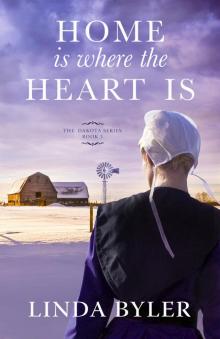 Home Is Where the Heart Is
Home Is Where the Heart Is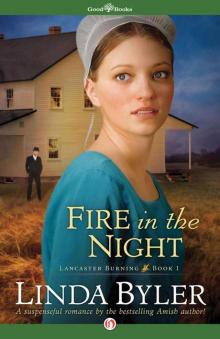 Fire in the Night
Fire in the Night When Strawberries Bloom
When Strawberries Bloom Little Amish Lizzie
Little Amish Lizzie Which Way Home?
Which Way Home? The Homestead
The Homestead Sadie’s Montana Trilogy
Sadie’s Montana Trilogy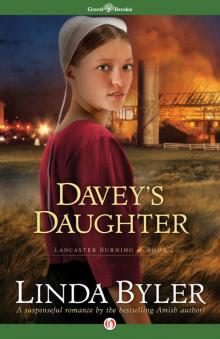 Davey's Daughter
Davey's Daughter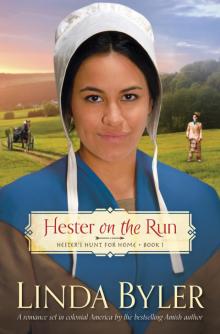 Hester on the Run
Hester on the Run Disappearances
Disappearances Big Decisions
Big Decisions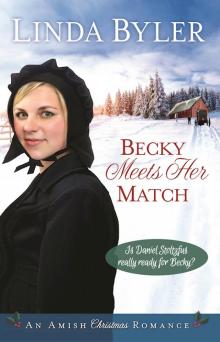 Becky Meets Her Match
Becky Meets Her Match Hope on the Plains
Hope on the Plains Christmas Visitor
Christmas Visitor